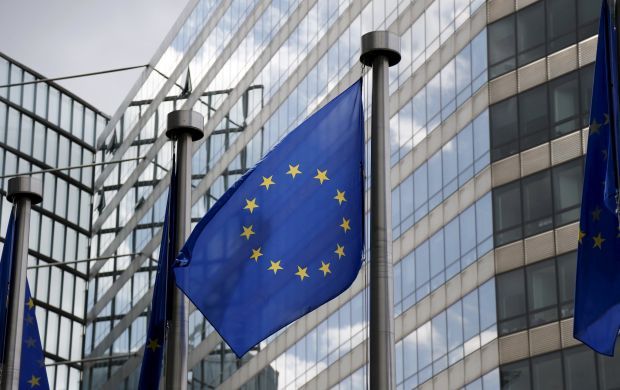
The continuation of the sanctions is part of an effort to maximize the bloc's leverage in pushing the Kremlin to fully implement its side of the Minsk ceasefire agreement, the officials say.
The decisions are likely to deepen tensions with the Kremlin, which had appeared to be hoping to split the EU over sanctions policy and was hoping the relative quiet in eastern Ukraine since the ceasefire accord was signed on February 12 would encourage its friends in the bloc to at least lighten the measures.
While the plans aren't finalized—some haven't even been formally discussed yet at EU level—the officials say there is growing confidence in Brussels that the bloc is united behind a policy which would ensure no weakening of EU pressure on Russia until Moscow has fully met its ceasefire commitments.
"You don't have that doubt any longer," one senior official said, according to the Wall Street Journal.
Under the current plans, the bloc would take a political decision at a summit on June 25-26 to extend the economic sanctions to the end of January, the officials said. That date hasn't been nailed down yet. But several officials said it would give member states proper time to assess Russia's Minsk compliance.
The plans would also see the bloc extend next month the targeted travel bans and asset freezes on individual Russians and Ukrainian separatists from the current mid-September expiry date probably to the end of January, some of the officials said.
Later this month, the EU is also widely expected to roll over for a year sanctions specifically targeted at Crimea and Russian firms and people doing business there.
The Wall Street Journal refers to senior officials in Brussels who say they have seen no sign that Athens is set to block a sanctions renewal, which needs the backing of all member states.
As is known, after weeks of debate, EU leaders agreed at a March summit that any easing of the economic sanctions, which expire at the end of July, "should be clearly linked to the complete implementation of the Minsk agreements, bearing in mind that this is only foreseen by 31 December 2015."
UNIAN's reference. Russia annexed the Ukrainian territory of Crimea in March 2014 after invading the peninsula with its troops, and then began to destabilize the situation in the Donbas. Later, the self-proclaimed Donetsk and Luhansk People's Republics (DPR and LPR) were created, with the direct participation of Russian special forces and the support of Russian army in Donbas, according to Ukraine.
A growing body of evidence shows Russia also supplies weapons to the militants of the DPR and LPR and sends mercenaries and its regular troops to fight in the Donbas.
The European Union, the United States, Canada, Japan, Australia and several other countries imposed sanctions against Russia because of its annexation of the Ukrainian territory of Crimea and its destabilization of eastern Ukraine.

